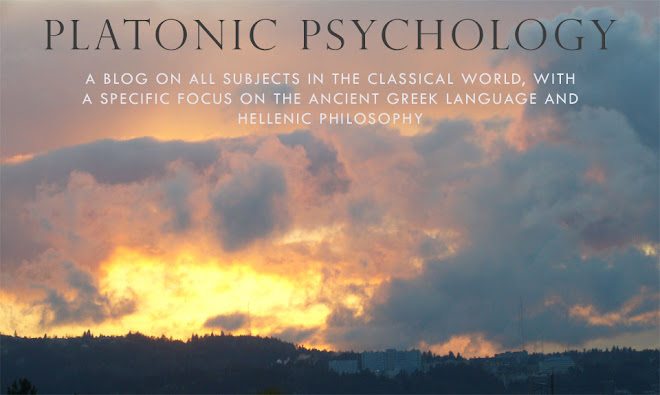I am finally back to my Sallust paper after my Plato paper. It's going to be quite a rush to get it done. Anyway, as I'm working on the paper I thought I would post Chapter 2 of the
Bellum Catalinae. It's been a while since I read this the first time and I found that English, in places, was more restrictive than I would like-- or maybe I'm just having problems with my Latin.
Igitur initio reges (nam in terris nomen imperi id primum
fuit) divorsi pars ingenium, alii corpus exercebant: etiam tum vita hominum
sine cupiditate agitabatur; sua cuique satis placebant. Postea vero, quam in
Asia Cyrus, in Graecia Lacedaemonii et Athenienses coepere urbis atque nationes
subigere, lubidinem dominandi causam belli habere, maxumam gloriam in maxumo
imperio putare, tum demum periculo atque negotiis compertum est in bello
plurumum ingenium posse. Quod si regum atque imperatorum animi virtus in pace
ita ut in bello valeret, aequabilius atque constantius sese res humanae
haberent neque aliud alio ferri neque mutari ac misceri omnia cerneres. Nam
imperium facile iis artibus retinetur, quibus initio partum est. Verum ubi pro
labore desidia, pro continentia et aequitate lubido atque superbia invasere,
fortuna simul cum moribus inmutatur. Ita imperium semper ad optumum quemque a
minus bono transferetur.
Quae homines arant, navigant, aedificant, virtuti
omnia parent. Sed multi mortales, dediti ventri atque somno, indocti incultique
vitam sicuti peregrinantes transiere; quibus profecto contra naturam corpus
voluptati, anima oneri fuit. Eorum ego vitam mortemque iuxta aestumo, quoniam
de utraque siletur. Verum enim vero is demum mihi vivere atque frui anima
videtur, qui aliquo negotio intentus praeclari facinoris aut artis bonae famam
quaerit. Sed in magna copia rerum aliud alii natura iter ostendit.
And so in the
beginning, kings -- for this was the name of power first in the land-- kept
busy pursuing opposite courses, some with the mind, others with the body; even
then the life of men was conducted without desire, his own things were sufficiently
pleasing to him. But at last, after Cyrus in Asia and the Lacadamonians and the
Athenians in Greece began to subjugate cities and peoples, lust was deemed to
be a cause of subduing, they thought that the greatest glory is in the greatest
power, then at last knowledge was obtained through experiment and affairs that the mind is the most able in war. But if the virtue
of the minds of kings and rulers were strengthened by peace in this way as by
war, the human affairs would be situated more similarly and more constantly,
neither would you discern one thing be carried by another nor all things be
mixed. for power easily is easily retained by those arts with which it was
obtained at first. But where idleness instead of labor, and equally desire and
arrogance instead of self-restraint has burst in, at the same time fortune
changes with the mores. In this way, power always is transferred from a less
good man to whomever is best.
These things which men [do when
they] plow, sail, build, all depend upon virtue. But many mortals, having given
[themselves over] to appetitive and sleep, pass through life ignorant and
uncultured just as wanderers. To whom, certainly, against nature the body has
pleasure while the life-force is a burden. For them, I estimate that life and
death are equal, because about both there is silence. But truly he alone seems
to me to live and to delight in his life-force, who being intent upon some
occupation seeks famous deeds or reputation through good conduct. But in the
great abundance of these things, nature shows one path to one, one path to
another.
Paper is due in just over 24 hours.


